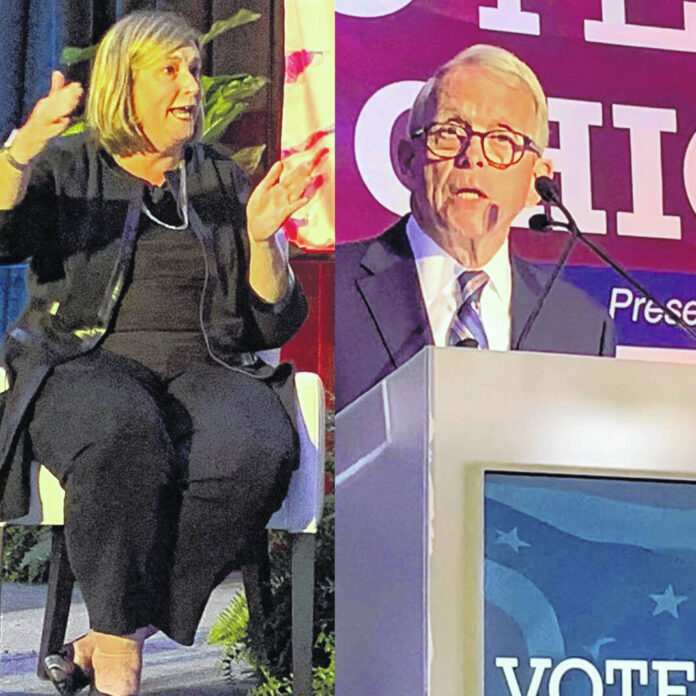COLUMBUS, Ohio — Gov. Mike DeWine and Democratic opponent Nan Whaley on Thursday perhaps came as close as they’ll get to a debate this campaign season – they spoke in the same building on the same day.
DeWine and Whaley discussed children’s issues during an appearance at the Vote For Ohio’s Kids leadership forum at the Greater Columbus Convention Center. Whaley, the former mayor of Dayton, spoke separately about an hour after DeWine, a Greene County Republican running for re-election.
During the hour-long speech and Q&A session, DeWine touted his administration’s effort to help children – an issue that has been a top priority of the governor during his first term in office.
The governor spoke at times as if his re-election was a done deal, saying he would present state lawmakers in the “next several months” a proposal to boost state funding for behavioral-health research. He also touted his sweeping proposal to help Ohio children, including by expanding Medicaid eligibility and publicly funded child care for lower-income Ohioans, adding mental health resources for post-partum mothers, and boosting foster-care spending.
He also touted his administration’s efforts to double state funding to find and replace toxic lead pipes around the state.
The questions DeWine and Whaley fielded were not asked by journalists. The governor quickly left the event afterward without taking questions from reporters.
Whaley called for more long-term funding to expand mental health services for children and addiction treatment.
DeWine, she said, “talks a good game” about efforts to reduce drug overdoses in Ohio, “but then cuts (funding) to the bone to take care of the very wealthy in this state.”
Participating in debates was once considered a requisite part of running for governor, but DeWine is on track to become the second straight incumbent governor (after Republican John Kasich in 2014) to turn down debates altogether.
DeWine told reporters in August that he was sure he and Whaley would square off in newspaper editorial board meetings this fall, some of which (including cleveland.com/The Plain Dealer’s editorial board) stream the meetings online and serve as de facto debates. However, it remains to be seen whether DeWine will participate in such meetings.
Whaley has called DeWine’s refusal to debate “anti-democratic” and “cowardly.” But perhaps the main reason for DeWine’s hesitancy to debate is that, because he has a double-digit lead over Whaley in recent polls, debates would have little upside for him and would only give Whaley a chance to win over voters or capitalize on any misstep by the governor.
Asked about that, Whaley said she still twice debated her primary opponent, ex-Cincinnati Mayor John Cranley, even though she ended up winning by more than 30 percentage points.
“If you’re a governor, you have a responsibility to talk directly to people about why you deserve a second term,” Whaley said.
Whaley’s campaign tried to draw attention to his refusal to debate by having a person in a giant chicken outfit stand outside the convention center event on Thursday.
“We think DeWine should debate us, don’t you think?” Whaley asked. “I think he’s being a chicken.”







